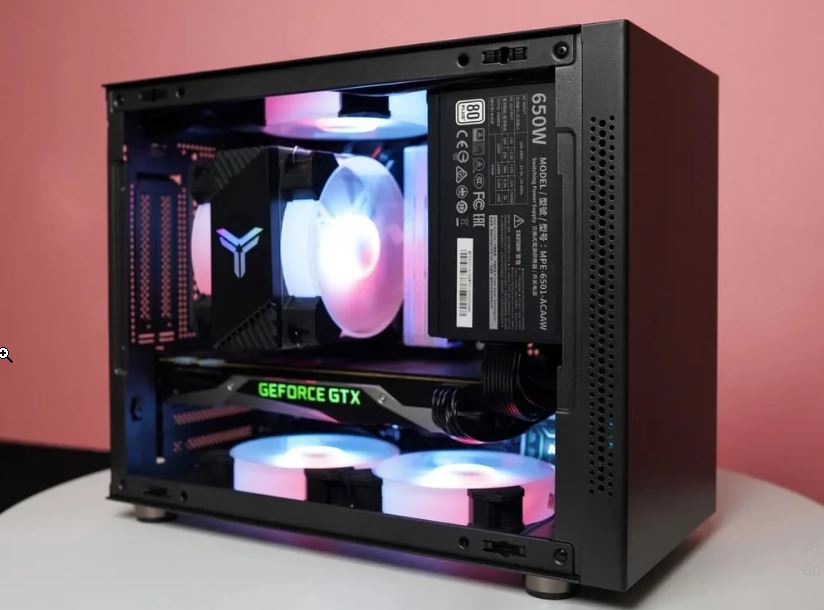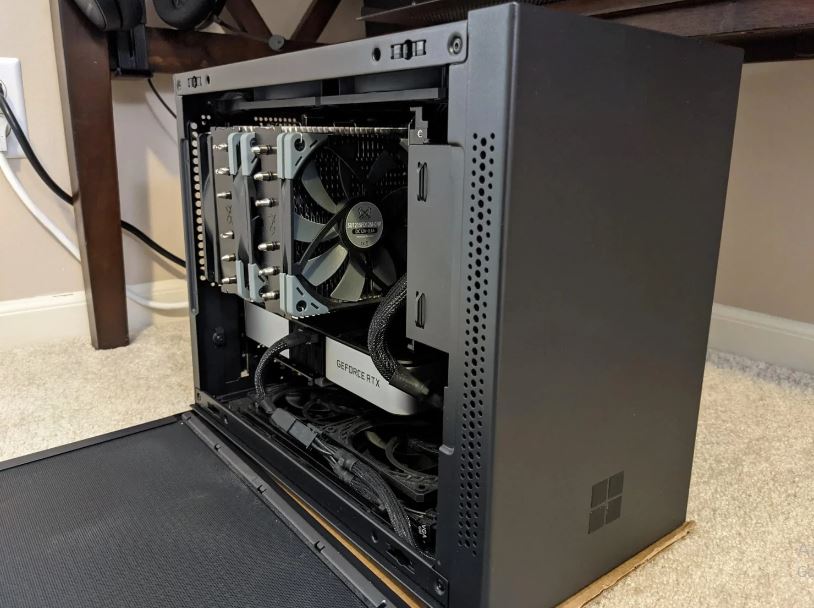A lot of us are no longer comfortable with bulky hardware. In fact, the need for smaller PCs and, as a result, smaller ATX cases is on the rise. Fortunately, PC manufacturers are also catching up on the trend, and there are now a lot of small cases for compact PCs on the market. Which is why this article will handle the smallest ATX cases for compact PC. So you can know which to pick.
The smallest ATX case for a compact PC is a compact computer case designed to accommodate ATX motherboards while maintaining a small form factor. These cases make space efficiency a priority. It is ideal if you want a powerful PC built with as little floor or desk space as possible.
A lot of effort goes into an ATX case for a compact PC because they have very limited inside space. So, if a small ATX case has to be selected carefully, how do you know what to look out for when you are shopping for an ATX case for a compact PC? This article will explore the world’s smallest ATX case for compact PCs. So keep reading.

What Is Atx
ATX stands for Advanced Technology Extended. It is a specification and form factor for computer motherboards, power supplies, and computer cases. Intel first introduced Atx in 1995, and it has since become a widely used standard in the PC industry.
ATX specifies the size and layout of the motherboard. ATX motherboards are typically 12 x 9.6 inches (30.5 x 24.4 cm) in size, although there are variations like micro-ATX and mini-ATX with smaller dimensions. They are designed to work with ATX power supplies. These power supplies provide the necessary electrical power for your computer.
ATX motherboards typically have several expansion slots, including PCI slots, PCIe slots, and memory slots, allowing users to add graphics cards, sound cards, and other expansion cards. They come with a standard rear I/O panel layout for connecting peripherals and accessories, such as USB ports, audio jacks, and Ethernet ports.
The ATX power connector on the motherboard is a standardized connection for the power supply, delivering power to the motherboard and its components. The cases often include standardized mounting points for cooling fans and radiators, ensuring efficient airflow to keep the components cool.
ATX is popular because it provides a balance between expandability and compatibility. It allows for a wide range of component choices and provides a standard platform for PC builders. However, smaller variants like micro-ATX and mini-ITX are also available for those who want more compact systems.
In summary, ATX is a computer hardware standard that specifies the size and layout of motherboards, power supplies, and cases, providing compatibility and expandability for PC builds.
Factors To Consider While Choosing A PC Case Size
When choosing a PC case size, there are a lot of things to consider. Knowing what to look out for while choosing a PC case is important. Here are some key factors to keep in mind while choosing a PC case size:
-
Motherboard Compatibility
The first and most crucial factor is ensuring that the case is compatible with your motherboard’s form factor (e.g., ATX, micro-ATX, or mini-ITX). The case should have mounting points and standoffs for your motherboard size.
-
Component Clearance
Check the dimensions of your graphics card, CPU cooler, and power supply. Ensure that the case can accommodate these components comfortably without clearance issues or obstructing airflow.
-
Cooling Options
Consider your cooling requirements. Determine if the case has enough space and mounting points for the number of fans or radiators you plan to install. Good airflow is crucial for keeping your components cool.
-
Storage Needs
Evaluate your storage requirements for SSDs and HDDs. Look for cases with adequate drive bays and mounting options. Some cases also offer hidden storage solutions for a cleaner look.
-
Expansion Slots
If you need to install additional expansion cards, like sound cards or capture cards, ensure the case has enough expansion slots to accommodate them.
-
Form Factors And Aesthetics
Choose a case size and design that align with your aesthetic preferences and the available space in your setup. Smaller cases are often preferred for minimalist or compact setups, while larger cases may offer more room for customization and cable management.
-
Port Accessibility
Check the accessibility of front and rear I/O ports, including USB, audio, and any other ports you need for your peripherals.
-
Cable Management
A case with good cable management features, such as routing holes, tie-down points, and ample space behind the motherboard tray, can make building and maintaining your PC much easier and neater.
-
Build Quality And Materials
Consider the build quality and materials used in the case’s construction. Premium materials like aluminum or tempered glass panels can enhance your PC’s overall look and feel.
-
Budget
Set a budget for your PC case. Cases come in a wide price range, so determine how much you’re willing to spend and find a case that offers the features you need within your budget.
-
Noise Considerations
Some cases come with noise-dampening features, which can be essential if you want a quieter PC. Consider your noise preferences when choosing a case.
-
Future Upgradability
Think about future upgrades. If you plan to expand your PC with additional components in the future, ensure that the case can accommodate these upgrades.
-
Brand And Reviews
Research case brands and read reviews from other users to get a sense of the case’s build quality, airflow, and ease of assembly.
Ultimately, the choice of PC case size should align with your specific use case, whether it’s a compact HTPC, a powerful gaming rig, a silent workstation, or something in between. Careful consideration of these factors will help you select the right case for your needs.

Best Atx Cases In 2023
There are a lot of ATX cases on the market. While we cannot explain all their specs and reviews, we will explain the five best ATX cases you can find on the market today. These cases include the following:
-
Corsair Carbide Air 540
The Corsair brand has a great reputation for designing superior computer products, and the Carbide Air 540 compact PC case is one of them. Its design is smaller, neater, and has a dual chamber in a cube design. The carbide-air 540 drivers and PSU are in the back chamber, while the CPU, GPU, and memory are in the main chamber.
This setup ensures that the system runs cool at all times because of the direct airflow the main chambers get. It is a great case if you are looking to overclock your system and push it to its limits.
The Corsair Carbide Air 540 offers a lot of room for expansion in case you need to add high-performance coolers. One disadvantage it has is its price. It is a little pricey if you are on a budget. It also has only a pre-equipped front dust filter.
-
Cooler Master Q500l
The Cooler Master Q500L is one of the best ATX cases out there. It combines space with an airflow-optimized front and panels on top to provide a case for your PC. Its fan mounts make it easy to pick the best small ATX case.
This product supports ATX, Micro-ATX, and Mini-ATX. It is made of quality steel and polymer and has a GPU length of 334mm. This case has two durable Xtraflo fans and can keep your system running cool.
-
Lian Li 001-Dynamic Mini
The Lian Li 011 Dynamic Mini is a small form-factor case with a very compact nature. It is so compact that you can use it on an ATX board. It has excellent cable management and great heat regulation. You can even build the case to support water cooling.
Despite these great features, the Lian Li 001 d-mini has some setbacks. It lacks support for an ATX PSU because of the SFF Chasis feature. Its price is quite reasonable, and it has just enough room for your components.
-
Cooler Master HAF XB EVO
Just like its name suggests, the Cooler Master HAF XB EVO is great at regulating the heat levels of all PCs. It has lots of fans and two radiators in both the front and rear to increase airflow. It even has four dust panels that remove dust and prevent its accumulation. The Cooler Master HAF XB EVO makes maintenance very easy, and this makes it one of the best small ATX cases for compact PCs.
However, one disadvantage is its complex assembly style. Assembling this case is not very straightforward and may require some expertise. Overall, it is strong, spacious, and has lots of customization options.
-
Nzxt H510
The NZXT H510 is the next generation of the NZXT H500. It has a very sturdy build, excellent cable management, and a minimal aesthetic style. This brand also offers custom liquid cooling and uses USB Type-C and updated I/O ports.
Its only disadvantage is its high cost. NZXT H5-10 is expensive. So it is not a good choice if you are on a budget. It is the best and most gorgeous ATX case on the market, with an even smaller booting footprint.
Frequently Asked Questions
What’s The Difference Between Atx, Micro-ATX, And Mini-ITX Cases?
These are different motherboard form factors. ATX is the largest, offering more space and features. Micro-ATX is smaller but still versatile, while mini-ITX is the smallest and is often used in compact builds.
How Important Is Cable Management In An ATX Case?
Cable management is crucial for airflow and aesthetics. Neatly organized cables ensure better cooling and a cleaner interior, making maintenance and upgrades easier.
Can I Fit A Large Graphics Card In A Compact ATX Case?
It depends on the case’s GPU clearance. Compact ATX cases might have limited space, so ensure your chosen case can accommodate the dimensions of your graphics card.
Conclusion
Choosing the right ATX case for your PC build is very important. The wrong choice can impact your component compatibility, cooling performance, aesthetics, and overall functionality. You have to consider a lot of factors that will determine what will suit your needs.
Keeping all these factors in mind, look through our list of the smallest ATX cases for compact PCs and make a choice on which fits you best. It is essential that you know that the PC case market is evolving every day. So, you need to make an informed choice.
